POETS Young Scholars Explore Chemical Reactions with DREAAM and Well Experience Students
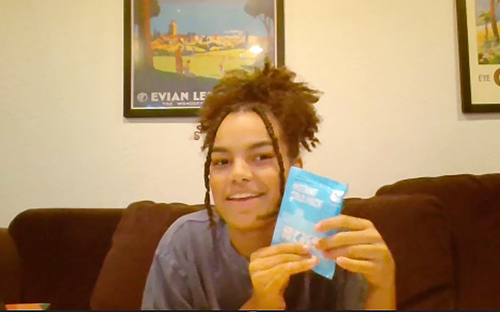
Above: Jasmine O'Connor introduces participants to a hands-on activity to learn about chemical reactions by dismantling a cold pack.
Below: O'Connor describes a procedure to the younger students.
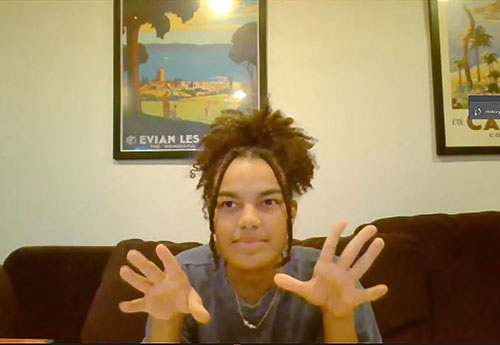
January 29, 2021
How does a hot pack or a cold pack work? What’s a chemical reaction and what does it do? Could a mini Sun Bucket be made using paraffin wax and a thermal electric generator, then used to dry food? On a Monday after school, both in Fall 2020 then again in Spring 2021, around 20 3rd–7th grade students involved in two Urbana nonprofits, DREAAM house and the Well Experience, discovered the answers to these and other questions. Teaching the students were four high school students, Jasmine O’Connor and Lily Weaver from Champaign Central High School and Ella Greer and Madeleine Keenan from University Laboratory High School (Uni High), who are part of the POETS (Power Optimization for Electro-Thermal Systems) Engineering Research Center’s 2020 Young Scholars (YS) program. Besides learning some science, the younger students saw near-peer role models who looked like them; the high schoolers saw themselves as the experts and had a chance to give back.
YS gives high schoolers the opportunity to engage in scholarly pursuits—conduct research, learn what it means to be part of a research team, even present their research. In addition, while POETS’ 2020–21 cohort of Young Scholars began their research in the summer of 2020, they are continuing it year-round, and also getting a chance to share their research. According to Joe Muskin, POETS’ Education Outreach Coordinator, another aspect of their program is that they’re encouraging their high school participants to give back via an outreach component employing near-peer mentoring. (This is when older students fairly close in age to younger students mentor them, which, according to research, enables the younger students to more readily identify with their mentors and what they are saying due to the proximity in age.) In this case, the high schoolers are just a few years older than many of the younger students they’re mentoring.
The younger students in the outreach were participants in a couple of Urbana programs, including DREAAM (Driven to Reach Excellence and Academic Achievement for Males), which Grainger Engineering has been working heavily with over the last couple of years. In fact, the now thriving university-community partnership was actually begun by POETS several years ago during its first YS program. That first year, they hired DREAAM’s founder, Tracy Dace, to do pre-programming coordination to get their high school participants ready to do research. Dace has also accompanied the Young Scholars on trips to Washington, DC (during non-COVID years) to the ERN (Engineering Researchers National) conference, where they have gotten a chance to present their research.
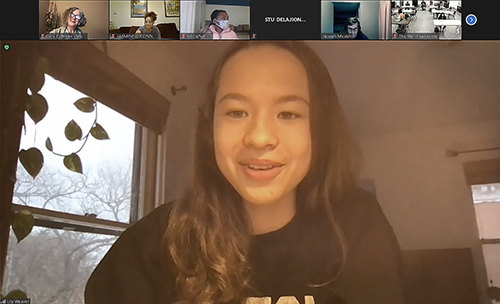
Above: Lily Weaver interacts with the younger students during their Zoom session.
Below: Weaver illustrates the Hot Hands heat pack they're to open.
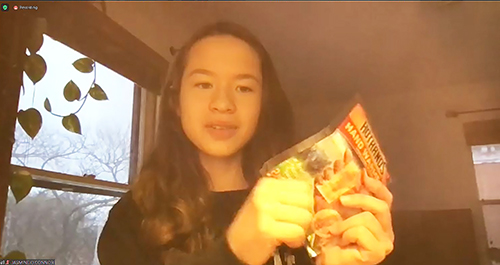
Also involved in the POETS partnership were girls from another local non-profit for underserved girls, called the Well Experience. The founder of this non-profit for girls of ethnicity is DREAAM’s Youth & Family Service Director, Stephanie Cockrell.
As part of the outreach, the POETS’ Young Scholars shared some of what they’ve learrned during their research. For instance, presenting in fall 2020 were Jasmine O’Connor and Lily Weaver from Champaign Central High School. The two had spent the summer conducting research about Sun Buckets technology, which harnesses the power of the sun to use in cooking; their main research was about using it to dry a variety of common foods. The science they taught the younger participants about on November 23rd was somewhat related to that—endothermic and exothermic reactions. The students discovered that chemical reactions are responsible for the temperature changes in hot and cold packs. In addition to talking about some of the science, the two also led the younger students in hands-on activities—they had the kids dissect hot packs and cold packs to see how they work.
In spring 2021, Muskin plans to have two Uni High students share activities also related to Sun Buckets. The two students will try to simulate a little sun bucket with paraffin wax and a thermal electric generator. “They're going to actually try to use a wax,” Muskin explains, “because wax has a nice low melting point, then get a fan to show how a more powerful system, like the sun bucket, could actually produce quite a bit of power and dry seeds and so on by blowing air through.”
The Young Scholars’ outreach program appears to be a win-win for both groups of students. For the high schoolers, it’s a chance to learn how to communicate their research, not just to adults, but to younger kids, something researchers often must work at, especially in terms of eliminating jargon. “Now they're the experts,” Muskin explains. “They're the ones who are going to teach others. It kind of shows them that they're progressing and that they're not just a student; they're actually now also the expert.”
A Junior at Champaign Central High School, Jasmine O’Connor, explains why she got involved with the outreach. O’Connor, whose plans for the future involve studying chemistry as an undergrad on a pre-med track in order to become a pediatric surgeon or a doctor, shares:
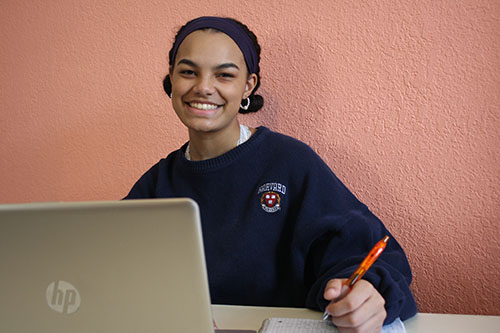
Champaign Central High junior Jasmine O'Connor. (Image courtesy of Jasmine O'Connor.)
“I knew that it would be an amazing opportunity to help kids become immersed in the STEM field in a hands-on way,” she says. “I also believed that it would be a unique way to spend time with the kids and tell them about the things that Lily and I accomplished this past summer. Being aware of the current challenges due to COVID-19 I knew that a lot of kids are currently not able to have the same hands-on learning opportunities that they would've had in the past and this would be the closest way that they might be experiencing that.”
Citing how much she enjoys teaching children, she adds, “I also absolutely love working with and teaching kids (hence the field of pediatrics), I knew that if I could share at least an ounce of my excitement about science with one of those kids, it would be worth it.” A part-time children's dance teacher, she acknowledges that when teaching children and making educational content both digestible and fun she feels “very in my element.”
Indicating that she hoped she and Lily would “be able to encourage these kids, help them grow their critical thinking skills and get excited about science in general.” Reminiscing about how when she was a quite young, she was always doing experiments, mixing baking soda and vinegar and watching it bubble and fizz, she was determined that their young participants would have a similar experience, despite it being done over Zoom. “I wanted the kids that I was virtually interacting with to have that same excitement when they walked away from our time together over Zoom. I wanted them to walk away learning at least one new thing that they would be elated to share with someone around them and I think that Lily and I were able to achieve that. Even though we were virtual, it was amazing to be able to see the gears turning inside of the brains of these young scientists.”
Regarding the impact she and Lily had on the younger students, O’Connor relates that the kids definitely seemed to understand what they were teaching and talking about. “It was amazing to hear them asking relevant questions and coming up with different hypotheses in regards to the content that we were covering,” she recounts. “They were all super excited and ready to listen to what we had to say.” She also appreciated the level of participation and problem-solving from the students. “It was amazing to see how willing that these young scientists were to learn new vocabulary words, follow instructions, and answer questions,” she says. “I believe that the impact of our lesson was a special one that left a lasting impression on these students.”
O’Connor also believes she and Lily successfully served as role models, portraying the diversity needed in science. “Seeing two intelligent and hard-working female high school students from two different backgrounds and races leading an informational lesson about STEM is not something that you see every day,” she admits. “The opportunity to inspire, prosper and communicate skills of critical thinking, creating predictions, establishing hypotheses, and encouraging these students to walk away with a greater understanding and passion for science is priceless to me.”
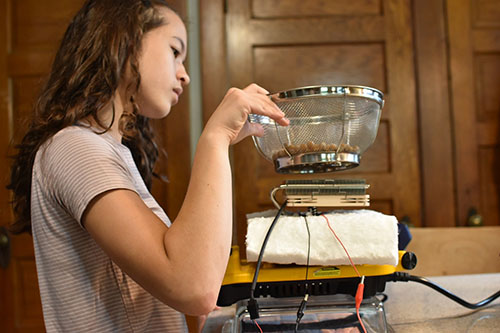
Lily Weaver uses Sun Buckets technology to dry food as part of her summer 2020 POETS Young Scholar research project. (Image courtesy of Lily Weaver.)
Muskin echoes O’Connor’s take on the benefits the outreach provided for the younger students—the DREAAM and Well Experience kids. Besides learning some science they might not know and getting to do hands-on activities to inculcate those scientific principles, he believes the older kids served as role models for them, and demonstrated that getting interested in science is cool and can actually a viable career to aim for.
“I think it's good for them to see near peers,” Muskin explains, “and especially students of color. That they can see that ‘There is actually this path that we can take and become professionals and researchers and get interested in science. And it's kind of cool, and here's some students doing it, and they're like me; they're close to my age.’ So, I think that's really powerful. I think that's a good thing for the DREAAM kids.”
Regarding their emulating the high schoolers in their role as experts, he adds, “And then to see that they're not so far themselves from starting to become experts, I think that's important. I know kids tend to think of themselves as the learners, not the teachers. I think it's good for them to see, ‘Oh, you know what, look, that person's just a few years older than me. I could actually be that teacher pretty soon. I can be the one, the expert showing everybody that they have more capabilities and actually can kind of learn to be the authoritative voice—the person who's deciding things and leading things.’ So, I think that's important.”
Questioning why folks doing outreach hadn’t been implementing something like near-peer mentoring years and years ago, he adds, “I think it's an important thing, and it shows the progression, and it shows that you're not that far away from that next step.
How’d the high school girls do? An expert himself at STEM outreach, Muskin thought they did a fantastic job. “I was really pleased with the way they conducted themselves, and the way they engaged the students. I think they had a teaching style that was very safe and approachable and made it fun. So, I was really excited that they did such a wonderful job with the teaching.”
Story by Elizabeth Innes, Communications Specialist. Images by Elizabeth Innes unless otherwise noted.
For additional articles about POETS, see:
- POETS Young Scholars Find Sun Buckets Summer Research Experience Meaningful
- POETS' Young Scholars Program Attracts High Schoolers to Research
- Local 8th Graders Build Solar Cars Courtesy of new POETS' RET Curriculum
- POETS Seeks to Change the Attitudes, Shape of Students in the STEM Pipeline
- POETS, New NSF Center at Illinois, Poised to Revolutionize Electro-Thermal Systems
- POETS website
More: POETS, High School Research, 2021
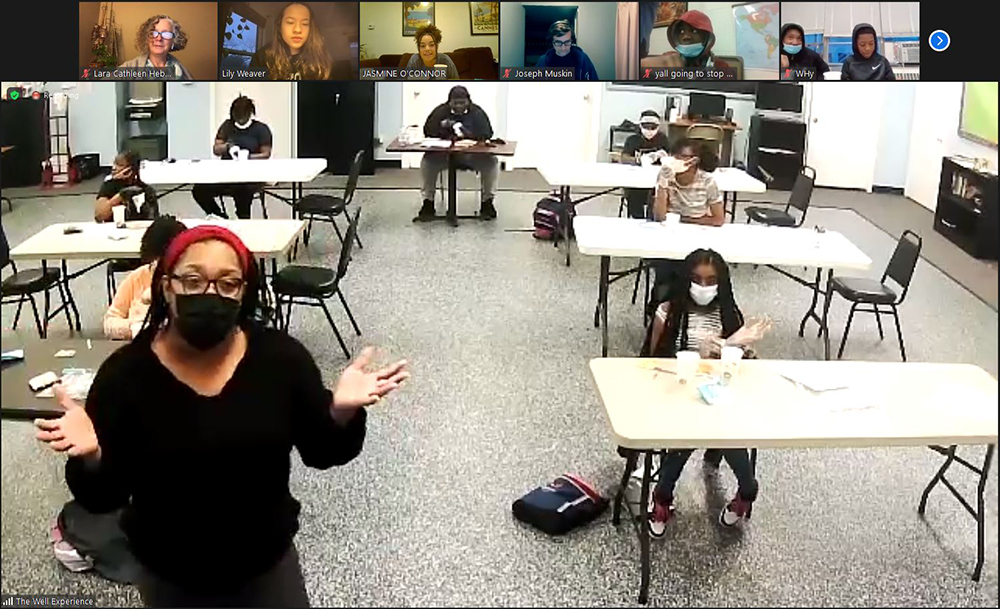
Stephanie Cockrell, Founder of the Well Experience, interacts with the POETS Young Scholars about her students' progress on the activity.













.jpg)
















